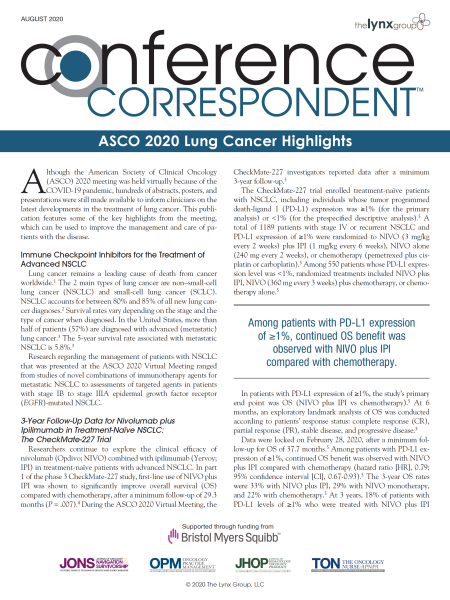The current state of our nation has resulted in an ever-present focus on the COVID-19 virus. This is fully warranted given its indescribable impact on the psychological, emotional, and financial well-being of individuals and communities worldwide. As our society tunes in daily to a barrage of pandemic casualty data, a number of smokers have expressed increased interest in assistance with smoking cessation. This observation of increased “readiness to quit” is likely influenced by reports concerning patients infected with COVID-19 who smoke having poorer outcomes than those who do not. Read More ›
By William King
Capmatinib (Tabrecta), an oral kinase inhibitor, has shown clinical activity in patients with high-level MET-amplified advanced non–small-cell lung cancer (NSCLC), according to new data presented at the ASCO 2020 virtual annual meeting. Read More ›
Updated results of the phase 3 CASPIAN clinical trial continue to show that durvalumab (Imfinzi) added to standard chemotherapy improves overall survival (OS) for patients with treatment-naïve extensive-stage small-cell lung cancer (ES-SCLC), according to a presentation at the ASCO 2020 virtual annual meeting. Read More ›
By William King
Treatment with osimertinib (Tagrisso) in the adjuvant setting significantly improves disease-free survival (DFS) in patients with localized non–small-cell lung cancer (NSCLC) with an EGFR mutation, according to results presented by Roy S. Herbst, MD, PhD, FACP, FASCO, Chief of Medical Oncology, Yale Cancer Center, New Haven, CT, at the ASCO 2020 virtual annual meeting. Read More ›
Although the American Society of Clinical Oncology (ASCO) 2020 meeting was held virtually because of the COVID-19 pandemic, hundreds of abstracts, posters, and presentations were still made available to inform clinicians on the latest developments in the treatment of lung cancer. This publication features some of the key highlights from the meeting, which can be used to improve the management and care of patients with the disease.
Read More ›On June 15, 2020, the FDA accelerated the approval of lurbinectedin (Zepzelca; Jazz Pharma/Pharma Mar), an intravenous alkylating drug, for the treatment of adults with metastatic small-cell lung cancer that has progressed during or after platinum-based chemotherapy. The FDA granted lurbinectedin an orphan drug designation for this indication. Read More ›
On May 29, 2020, the FDA approved ramucirumab (Cyramza; Eli Lilly) in combination with erlotinib (Tarceva) for first-line treatment of patients with metastatic non–small-cell lung cancer (NSCLC) and epidermal growth factor receptor (EGFR) exon 19 deletions or exon 21 (L858R) mutations. Ramucirumab was previously approved for several types of cancer, including, in combination with docetaxel, for metastatic NSCLC, after platinum-based chemotherapy. Read More ›
On May 26, 2020, the FDA approved nivolumab (Opdivo; BMS) and ipilimumab (Yervoy; BMS) plus chemotherapy as first-line treatment of recurrent or metastatic squamous or nonsquamous non–small-cell lung cancer (NSCLC), regardless of PD-L1 expression, and with no EGFR or ALK aberrations. On May 15, the FDA approved nivolumab plus ipilimumab as first-line treatment of metastatic NSCLC with PD-L1 ≥1% expression. Read More ›
Immune-related adverse events did not affect the clinical benefit of consolidation checkpoint inhibitor therapy after chemoradiation in stage III non–small-cell lung cancer. Read More ›
The frequency and durability of outcomes associated with acquired resistance to PD-1 inhibition in non–small-cell lung cancer are presented. Read More ›



